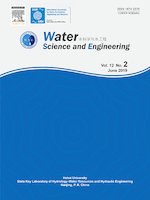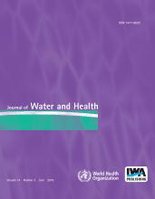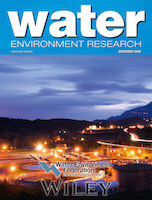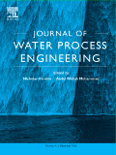
Environmental Science-Water Research & Technology
Scope & Guideline
Advancing knowledge in water science and technology.
Introduction
Aims and Scopes
- Water Quality Assessment:
The journal emphasizes studies that assess water quality through various methods, including microbiological, chemical, and physical analyses, to understand contamination sources and impacts. - Advanced Treatment Technologies:
Research on innovative treatment technologies for wastewater and drinking water, including membrane processes, advanced oxidation processes, and biofiltration, to enhance pollutant removal efficiency. - Resource Recovery and Sustainability:
Exploration of methods for recovering resources from wastewater, such as nutrients and energy, contributing to circular economy principles and sustainable water management. - Microbial Ecology and Bioremediation:
Studies focusing on the role of microorganisms in water treatment processes, including bioremediation and the management of microbial communities in engineered systems. - Contaminant Fate and Transport:
Research on the behavior, fate, and transport of contaminants in aquatic environments, including the development of predictive models to inform risk assessments. - Policy and Regulatory Frameworks:
Investigations into the implications of water quality research on policy-making and regulatory frameworks, promoting evidence-based approaches to water management.
Trending and Emerging
- Wastewater-Based Epidemiology:
The rising interest in utilizing wastewater for public health surveillance, particularly related to monitoring pathogens like SARS-CoV-2, highlights the importance of integrating environmental monitoring with public health. - Emerging Contaminants and Microplastics:
There is an increasing emphasis on the study of emerging contaminants, including pharmaceuticals and microplastics, reflecting growing environmental concerns and regulatory scrutiny. - Digital Technologies and Data Analytics:
The integration of machine learning and data analytics in water quality monitoring and treatment process optimization is becoming more prevalent, showcasing the journal's commitment to innovative research methodologies. - Sustainable Water Management Practices:
Research focusing on sustainable practices, resource recovery, and the circular economy in water treatment is gaining traction, emphasizing the need for holistic approaches to water resource management. - Nanotechnology and Advanced Materials:
There is a growing trend towards the application of nanotechnology and advanced materials in water treatment processes, indicating a shift towards more effective and efficient contaminant removal methods.
Declining or Waning
- Traditional Water Treatment Methods:
There has been a noticeable decrease in studies focused solely on conventional water treatment methods, as the emphasis shifts towards advanced technologies that offer greater efficiency and sustainability. - Chemical Disinfection Techniques:
Research specifically centered on traditional chemical disinfection techniques, such as chlorination, has waned in favor of innovative and less harmful alternatives, such as advanced oxidation processes. - Single-Contaminant Studies:
There is a declining trend in studies analyzing single contaminants in isolation, moving instead towards comprehensive approaches that consider multiple contaminants and their interactions. - Laboratory-Scale Studies:
The focus has shifted from laboratory-scale experiments to pilot and full-scale studies that provide real-world applicability and validation of research findings.
Similar Journals

ENVIRONMENTAL SCIENCE & TECHNOLOGY
Driving interdisciplinary dialogue for pressing environmental challenges.ENVIRONMENTAL SCIENCE & TECHNOLOGY, published by the American Chemical Society, is a premier journal dedicated to the rapid dissemination of innovative and impactful research in the fields of environmental science and technology. With an ISSN of 0013-936X and an E-ISSN of 1520-5851, this journal boasts a remarkable Q1 ranking across multiple categories including Chemistry (Miscellaneous), Environmental Chemistry, and Medicine (Miscellaneous) for 2023, reflecting its crucial role in advancing interdisciplinary approaches to pressing environmental issues. Notably, it holds prestigious Scopus rankings, being ranked #26 in General Chemistry and #10 in Environmental Chemistry, placing it in the top portions of its respective categories with unmatched visibility at the 93rd percentile. Spanning a publication history from 1967 to 2024, the journal serves as a vital resource for researchers, professionals, and students aiming to contribute to sustainable solutions and scientific advancements. By prioritizing rigor and relevance, ENVIRONMENTAL SCIENCE & TECHNOLOGY fosters academic dialogue and innovation within these crucial fields, making it an essential read for anyone invested in environmental progress.

Water Science and Engineering
Unveiling the Science Behind Water Engineering ExcellenceWater Science and Engineering, published by ELSEVIER, is a premier open access journal that has been disseminating vital research in the realms of civil and structural engineering as well as ocean engineering since 2008. With its ISSN 1674-2370 and E-ISSN 2405-8106, this journal plays a crucial role in advancing knowledge and innovation within the sector, evidenced by its impressive rankings in Scopus—holding the 15th position out of 105 in Ocean Engineering and 76th out of 379 in Civil and Structural Engineering, placing it in the 86th and 80th percentiles, respectively. Attaining a Q1 classification in both categories for 2023 highlights its importance and influence in the academic and professional communities. The journal addresses a broad spectrum of topics integral to water sciences, offering significant insights for researchers, professionals, and students alike. With a convergence period spanning from 2010 to 2024, it continues to explore contemporary issues and advancements, providing a pivotal platform for the dissemination of research. The journal is accessible to a global audience, reaffirming its commitment to fostering open access and enhancing accessibility to vital scientific literature.

Membrane and Water Treatment
Innovating Water Solutions for a Sustainable FutureMembrane and Water Treatment is a prominent academic journal published by TECHNO-PRESS, dedicated to the fields of chemical engineering and water science. With an ISSN of 2005-8624 and E-ISSN 2092-7037, this journal aims to disseminate innovative research and technological advancements related to membrane technologies and water treatment processes. Since its inception in 2010, it has steadily contributed to the body of knowledge, achieving a Q3 ranking in Chemical Engineering and a Q4 ranking in Water Science and Technology as of 2023. Positioned within the 35th percentile of its respective categories in Scopus, it serves as a critically accessed platform for researchers and professionals eager to explore cutting-edge methodologies and solutions to water management challenges. Based in South Korea, Membrane and Water Treatment is committed to providing a scholarly environment where interdisciplinary and collaborative research can flourish, ensuring that readers remain at the forefront of developments in this essential field.

JOURNAL OF WATER AND HEALTH
Pioneering research for a healthier world through better water management.The JOURNAL OF WATER AND HEALTH, published by IWA PUBLISHING, serves as a leading platform for disseminating innovative research related to water quality, sanitation, and public health. With its ISSN 1477-8920 and E-ISSN 1996-7829, this esteemed journal significantly contributes to the fields of Public Health, Environmental Science, and Microbiology, as evidenced by its robust rankings in several quartiles, including Q2 in Public Health and Water Science and Technology in 2023. This periodical enjoys a convergence of years from 2003 to 2024, underscoring its continuous relevance in addressing critical global issues such as water safety and infectious diseases. Although not an open-access journal, the insights and findings presented are pivotal for researchers, professionals, and students eager to contribute to the sustainable management of water resources and health improvements worldwide.

Water Resources and Industry
Advancing Knowledge for a Water-Sustainable FutureWater Resources and Industry, published by Elsevier, stands at the forefront of research in the critical fields of water science and technology, as well as geography, planning, and development. With an impressive 2023 impact factor that places it in the Q1 category for both Geography and Water Science on a global scale, this journal is a vital resource for academics, professionals, and students seeking to advance their understanding of water-related issues impacting industries worldwide. Since its inception in 2013 as an Open Access journal, it has fostered innovative research and practical solutions to challenges in water resource management. Located in the vibrant academic hub of Amsterdam, the journal encourages submissions that cover a broad spectrum of topics, from sustainable practices and policy development to technological advancements in water treatment and distribution. By making its research publicly accessible, Water Resources and Industry not only contributes to scholarly discourse but also empowers stakeholders to implement evidence-based strategies for water sustainability, thereby enhancing its relevance and impact in today's world.

ACS ES&T Water
Championing high-quality research in water technology.ACS ES&T Water, published by the American Chemical Society, is a leading peer-reviewed journal focused on the interdisciplinary field of water science and technology. Since its inception in 2021, the journal has rapidly established itself as a prominent platform for research, boasting an impressive impact factor and ranking in the Q1 category across various disciplines, including Chemical Engineering, Chemistry, Environmental Chemistry, and Water Science and Technology. With a current Scopus rank of #66 out of 261 in Environmental Science and a remarkable percentile of 74%, ACS ES&T Water is dedicated to advancing the understanding of water-related challenges and solutions through high-quality research. The journal aims to facilitate communication among researchers, professionals, and policymakers by providing open access to innovative studies and methodologies that address critical issues in water resource management and sustainability. Collaborating at the intersection of chemistry and environmental science, this journal is essential for anyone invested in the future of global water security and innovation.

Water Research X
Driving ecological insights for effective water management.Water Research X is a prestigious journal published by ELSEVIER, focusing on the dynamic fields of water science and technology, pollution, ecological modeling, and waste management. Since its inception in 2018, this Open Access journal has become a cornerstone resource for researchers and professionals dedicated to advancing our understanding and management of water resources. Based in the United Kingdom, Water Research X holds an impressive ranking within the Scopus metrics, positioned in the Q1 category across multiple relevant disciplines, including Environmental Science, with a notable rank of 10/261 in Water Science and Technology and 3/41 in Ecological Modeling. This reflects its commitment to disseminating high-quality research that informs policy, supports sustainable practices, and fosters innovation in water management.

E-Water
Empowering Change through Water Research ExcellenceE-Water, published by the European Water Association, is a leading academic journal focused on the multifaceted field of water resource management and environmental sustainability. With the ISSN 1994-8549, this journal serves as a vital platform for researchers, professionals, and students dedicated to advancing knowledge in water science and related areas. Although currently not an Open Access journal, E-Water provides in-depth peer-reviewed articles, ensuring high-quality research dissemination. The journal is committed to showcasing innovative studies on water quality, conservation, and policy-making, making significant contributions to the field of water management both locally and globally. As water scarcity and environmental challenges continue to rise, E-Water stands as an essential resource for those involved in the stewardship of our most vital natural resource.

WATER ENVIRONMENT RESEARCH
Advancing sustainable solutions for our water future.WATER ENVIRONMENT RESEARCH is a leading scholarly journal dedicated to disseminating cutting-edge research in the fields of water science and technology. Published by WILEY, this esteemed journal (ISSN: 1061-4303; E-ISSN: 1554-7531) is renowned for its rigorous peer-reviewed articles that explore critical issues related to ecological modeling, environmental chemistry, pollution, and waste management. Established in 1992 and continuing through 2024, WATER ENVIRONMENT RESEARCH has secured a notable position within its category quartiles, ranking in the Q2 tier for several disciplines, including ecological modeling and water science and technology. It is highly regarded in the Scopus database, holding a rank of #53 out of 261 journals in Environmental Science related to Water Science and Technology, positioning it in the 79th percentile. As it continues to bridge research and practice, this journal serves as an essential resource for researchers, professionals, and students striving to advance knowledge and foster sustainable solutions within the water environment sector.

Journal of Water Process Engineering
Pioneering Interdisciplinary Approaches to Water EngineeringJournal of Water Process Engineering, published by Elsevier, stands as a leading authority in the interdisciplinary fields of Biotechnology, Process Chemistry and Technology, and Water Science and Technology. With its ISSN 2214-7144, this journal has established itself since its inception in 2014, reaching its convergence year in 2024. Renowned for its high-impact contributions, it holds a prestigious Q1 ranking in 2023 across multiple categories, including Safety, Risk, Reliability and Quality and Waste Management and Disposal. The journal aims to advance knowledge and practice in water processing, addressing global challenges related to water scarcity, environmental safety, and sustainable technology. While the journal does not currently offer open access options, it remains a vital resource for researchers, professionals, and students dedicated to advancing water process engineering and management practices. By disseminating innovative research and methodologies, the Journal of Water Process Engineering plays a crucial role in shaping future technologies and strategies essential for water sustainability.